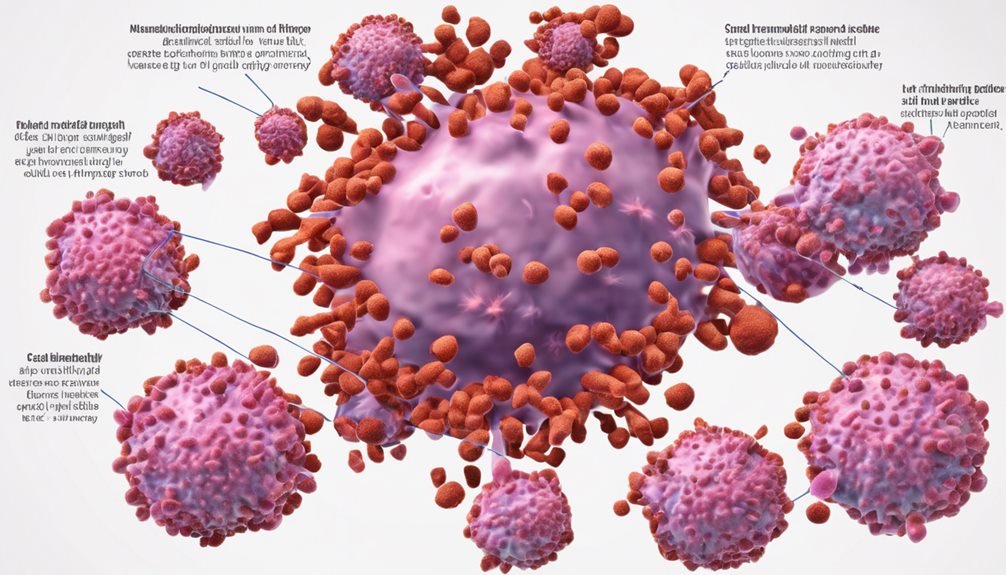When it comes to exploring the potential impact of Mebendazole on tumor growth, the intricate dance between this anthelmintic medication and cancer cells unveils fascinating insights. The mechanisms through which Mebendazole influences tumor progression are multifaceted, encompassing a spectrum of cellular processes that offer a glimpse into its therapeutic promise. As you consider how Mebendazole navigates the complex landscape of cancer biology, the implications for future treatment strategies and patient care beckon for a closer examination.
Key Takeaways
- Mebendazole inhibits tumor growth by targeting cell proliferation pathways.
- It prevents metastasis by interfering with processes leading to tumor spread.
- Anti-angiogenic properties restrict blood supply, slowing tumor growth.
- Mebendazole modulates the tumor microenvironment, sensitizing tumors to treatments.
- Dosage optimization is crucial for maximizing therapeutic benefits and minimizing side effects.
Mebendazole: Overview and Background
Mebendazole, a well-known anthelmintic medication, has garnered attention in recent years for its potential impact on tumor growth. When considering its usage in cancer treatment, understanding drug interactions and dosage optimization is crucial. Mebendazole, primarily used to treat parasitic infections, has shown promise in inhibiting cancer cell proliferation and inducing cell death.
Regarding drug interactions, it's important to note that Mebendazole has the potential to interact with certain medications, altering their effectiveness or causing adverse effects. Therefore, healthcare providers must carefully assess a patient's current medication regimen before prescribing Mebendazole for cancer treatment.
Dosage optimization is another critical aspect to consider when utilizing Mebendazole in cancer therapy. Finding the right balance between efficacy and safety is paramount to ensure optimal treatment outcomes. Researchers are actively investigating the most effective dosing regimens to maximize Mebendazole's anti-cancer properties while minimizing potential side effects.
Mechanisms of Mebendazole in Cancer
In understanding the impact of Mebendazole on tumor growth, it's essential to explore the mechanisms by which this anthelmintic medication exerts its potential anti-cancer effects. Mebendazole has been shown to affect cancer cells through modulation of cell signaling pathways and induction of apoptosis.
Cell signaling plays a crucial role in cancer progression, influencing cell growth, division, and survival. Mebendazole interferes with these signaling pathways, disrupting the communication that promotes tumor growth and metastasis. By targeting specific proteins involved in cell signaling, Mebendazole can inhibit cancer cell proliferation and induce cell cycle arrest.
Furthermore, Mebendazole has been found to induce apoptosis in cancer cells. Apoptosis, or programmed cell death, is a natural process that eliminates damaged or unwanted cells. Mebendazole triggers this mechanism in cancer cells, leading to their death and potentially reducing tumor size.
Understanding how Mebendazole affects cell signaling and induces apoptosis provides insight into its anti-cancer properties, offering potential avenues for targeted cancer therapies.
Inhibition of Tumor Growth

To impede tumor growth effectively, targeting key mechanisms that drive cancer progression is paramount. Mebendazole has shown promise in inhibiting tumor growth through various mechanisms. Here are three ways in which Mebendazole can impact tumor growth:
- Tumor Regression: Mebendazole has demonstrated the ability to induce tumor regression by inhibiting the growth of cancer cells. Studies have shown that Mebendazole can lead to a reduction in tumor size and volume, indicating its potential as a treatment for various types of cancer.
- Inhibition of Cell Proliferation: Mebendazole exerts its anti-cancer effects by targeting pathways involved in cell proliferation. By disrupting the processes that drive the uncontrolled growth of cancer cells, Mebendazole can effectively inhibit tumor growth and potentially slow down disease progression.
- Anti-Angiogenic Effects: Mebendazole has also been found to have anti-angiogenic properties, meaning it can inhibit the formation of new blood vessels that supply nutrients to tumors. By cutting off the blood supply to the tumor, Mebendazole can further impede tumor growth and progression.
Impact on Cancer Metastasis
As you consider the impact of Mebendazole on cancer metastasis, it becomes evident that addressing the spread of cancer to distant organs is a critical aspect of effective treatment strategies. Mebendazole shows promise in preventing metastasis by inhibiting the progression of tumors to other parts of the body. Studies have indicated that Mebendazole may interfere with the processes that lead to metastasis, potentially slowing down or halting the spread of cancer cells.
Metastasis prevention is a key focus in cancer treatment, as it's often the spread of cancer to vital organs that poses the greatest threat to a patient's health. By targeting tumor progression, Mebendazole offers a potential avenue for impeding the metastatic process, ultimately improving patient outcomes.
Understanding the mechanisms behind Mebendazole's impact on metastasis prevention can provide valuable insights into developing more effective strategies to combat advanced stages of cancer.
Further research into the specific ways in which Mebendazole influences tumor progression and metastasis could pave the way for novel therapeutic approaches in cancer treatment.
Anti-Angiogenic Properties

With its potential to inhibit the formation of new blood vessels that supply tumors, Mebendazole exhibits anti-angiogenic properties that can impact cancer progression. Mebendazole's effects on angiogenesis regulation and vascular development are crucial in impeding tumor growth. Here's how this works:
- Angiogenesis Regulation: Mebendazole interferes with the signaling pathways involved in angiogenesis, the process of forming new blood vessels. By disrupting this process, Mebendazole hinders the tumor's ability to create the necessary blood supply for its growth.
- Vascular Development: Mebendazole targets endothelial cells, which are crucial for blood vessel formation. By affecting these cells, Mebendazole inhibits the development of new blood vessels within the tumor microenvironment, leading to restricted blood supply and impeded tumor growth.
- Tumor Progression: By preventing the formation of new blood vessels, Mebendazole limits the tumor's access to nutrients and oxygen, ultimately slowing down its growth and metastasis potential. This anti-angiogenic property makes Mebendazole a promising candidate in cancer treatment strategies.
Effects on Tumor Microenvironment
Within the tumor microenvironment, Mebendazole's impact extends beyond its anti-angiogenic properties, influencing various factors that shape the surroundings where cancer cells thrive. Mebendazole has shown the ability to modulate the tumor microenvironment by reducing the secretion of pro-inflammatory cytokines, inhibiting tumor-associated macrophages, and altering the extracellular matrix composition. These effects contribute to creating an environment less conducive to tumor growth and progression.
The modulation of the tumor microenvironment by Mebendazole holds significant therapeutic implications. By targeting multiple components within the microenvironment, Mebendazole may enhance the efficacy of other cancer treatments by sensitizing tumors to immune responses and chemotherapy.
Furthermore, altering the tumor microenvironment can potentially reduce the risk of metastasis and improve overall patient outcomes.
Understanding Mebendazole's role in tumor microenvironment modulation provides valuable insights into its potential as a cancer therapy. By influencing the factors that support tumor growth, Mebendazole presents a promising avenue for developing novel treatment strategies aimed at disrupting the microenvironment to inhibit cancer progression.
Combination Therapy Potential

Combining Mebendazole with other cancer therapies holds significant promise in enhancing treatment efficacy and combating tumor growth. When considering combination therapy potential, two critical aspects to focus on are drug interactions and dosage optimization.
Key Considerations for Combination Therapy with Mebendazole:
- Drug Interactions: Understanding how Mebendazole interacts with other cancer drugs is crucial to avoid potential adverse effects or reduced efficacy. Researching the pharmacokinetics and pharmacodynamics of these interactions is essential for developing safe and effective combination regimens.
- Dosage Optimization: Finding the optimal dosage of Mebendazole in combination with other therapies is vital for achieving maximum therapeutic benefits while minimizing side effects. Fine-tuning the dosing schedule and amounts can lead to improved treatment outcomes and patient well-being.
- Synergistic Effects: Exploring how Mebendazole synergizes with specific cancer treatments can unveil potent combinations that target different pathways in tumor cells, enhancing overall anti-cancer effects.
Clinical Studies and Findings
For an in-depth examination of Mebendazole's impact on tumor growth and treatment outcomes, clinical studies and findings play a pivotal role in shaping our understanding of its therapeutic potential. Clinical studies have shown promising results regarding the treatment efficacy of Mebendazole in inhibiting tumor growth in various types of cancers. These studies have highlighted the drug's ability to reduce tumor size, delay progression, and even induce tumor regression in some cases.
Moreover, long-term outcomes from clinical trials have provided valuable insights into the sustained benefits of Mebendazole treatment. Researchers have observed prolonged remission periods, improved overall survival rates, and enhanced quality of life for patients receiving Mebendazole as part of their cancer therapy. These findings underscore the potential of Mebendazole as a valuable addition to existing cancer treatment regimens, offering hope for better outcomes and extended survival for individuals battling cancer.
As ongoing research continues to explore Mebendazole's full therapeutic potential, the results from clinical studies remain crucial in guiding future treatment approaches and improving patient care.
Safety and Side Effects

Building upon the insights gained from clinical studies regarding Mebendazole's impact on tumor growth and treatment outcomes, it's imperative to examine the safety profile and potential side effects associated with this drug.
Safety and Side Effects
- Safety Considerations
- Mebendazole is generally well-tolerated at standard doses.
- However, caution must be exercised in patients with liver disease due to potential hepatotoxicity risk.
- Consultation with healthcare providers is advised before initiating treatment, especially for individuals with pre-existing medical conditions.
- Side Effect Management
- Common side effects may include gastrointestinal symptoms such as nausea, diarrhea, and abdominal pain.
- Monitoring and symptomatic treatment can help alleviate these effects.
- Severe adverse reactions are rare but should be reported promptly to healthcare professionals for appropriate management.
Understanding Mebendazole's safety profile and being aware of potential side effects are crucial for optimizing treatment outcomes and ensuring patient well-being. Vigilance in monitoring for adverse reactions and prompt intervention when needed are essential components of effective care.
Future Research Directions
To advance our understanding of Mebendazole's potential in cancer treatment, future research endeavors should focus on exploring its mechanisms of action at the molecular level, elucidating its interactions with specific tumor types, and investigating the impact of varying dosages on treatment efficacy. Research on novel targets for Mebendazole could unveil new pathways for cancer therapy, potentially enhancing its effectiveness against different types of tumors. Additionally, exploring alternative dosing strategies may uncover optimal treatment regimens that maximize the drug's anti-cancer properties while minimizing side effects.
| Future Research Directions | ||
|---|---|---|
| Research Focus | Potential Impact | Key Achievements |
| Molecular Mechanisms | Understanding drug actions | Identify specific pathways |
| Tumor Interactions | Tailored treatments | Personalized medicine |
| Dosage Optimization | Enhanced efficacy | Minimized adverse effects |
Patient Perspectives and Experiences

Patient perspectives and experiences provide valuable insights into the real-world impact of Mebendazole as a potential treatment for cancer. Understanding patient testimonials and treatment outcomes is crucial in evaluating the effectiveness of Mebendazole. Here are key points to consider:
- Patient Testimonials: Hearing directly from patients who've undergone Mebendazole treatment offers firsthand accounts of their experiences, side effects, and overall satisfaction with the therapy. These testimonials can provide a more comprehensive understanding of the practical implications of using Mebendazole in cancer treatment.
- Treatment Outcomes: Analyzing treatment outcomes, such as tumor response rates, disease progression, and overall survival, helps in assessing the clinical benefits of Mebendazole. Tracking these outcomes can offer valuable data on the efficacy of Mebendazole in different types of cancer and stages of the disease.
- Quality of Life: Patient experiences also shed light on the impact of Mebendazole on the quality of life, including factors like symptom management, treatment tolerability, and overall well-being during the course of therapy. Understanding these aspects is essential for providing holistic care to cancer patients.
Conclusion and Takeaways
Drawing from patient testimonials, treatment outcomes, and quality of life assessments, the empirical evidence surrounding Mebendazole's impact on tumor growth presents a compelling case for its potential as a cancer treatment. Mebendazole's ability to inhibit cancer cell proliferation and induce cell death opens up a realm of potential applications in oncology. Its therapeutic implications extend beyond conventional chemotherapy, offering a promising alternative or complementary approach to treating various cancers.
| Key Takeaways |
|---|
| Mebendazole demonstrates significant anti-cancer properties |
| The drug shows promise in inhibiting tumor growth and metastasis |
| Patients report improved quality of life and symptom management |
The data-driven analysis of Mebendazole's effects on tumor growth underscores the importance of further research to unlock its full therapeutic potential. By considering Mebendazole as a viable option in cancer treatment, we can strive towards more personalized and effective care for individuals battling this complex disease.
Frequently Asked Questions
Can Mebendazole Be Used to Prevent Cancer Development?
Yes, mebendazole shows promise in preventing cancer development in clinical trials. Its mechanism involves targeting microtubules, which disrupts cancer cell growth. Efficacy studies are ongoing, indicating potential benefits in cancer prevention.
Keep an eye on emerging research for further insights into how mebendazole could be utilized for this purpose. Stay informed on the latest findings to understand the full scope of its preventive capabilities.
Are There Any Dietary Restrictions While Taking Mebendazole?
To maintain optimal health while taking mebendazole, it's crucial to consider some nutritional aspects. Ensure a balanced diet rich in vitamins and minerals to support your body during treatment. Avoid excessive consumption of alcohol or caffeine, which can interfere with medication effectiveness. Make lifestyle adjustments by incorporating regular exercise and adequate hydration. Prioritize your well-being by following these guidelines for a successful treatment journey.
Does Mebendazole Interact With Common Cancer Treatments?
When taking mebendazole, it's important to note its potential synergistic effects with common cancer treatments. Clinical trial evidence suggests that mebendazole may interact positively with certain cancer therapies, enhancing their effectiveness.
It's crucial to consult with your healthcare provider to understand how mebendazole may impact your specific cancer treatment plan. Stay informed about any potential interactions to ensure you receive the best possible care.
How Long Does It Take for Mebendazole to Show Effects on Tumors?
When using mebendazole for tumors, the tumor response timeline varies. In clinical trials, some patients saw effects within a few weeks, while others took months. Outcomes depended on factors like tumor type and individual response. Regular monitoring is crucial to assess progress.
Can Mebendazole Be Used in Pediatric Cancer Treatment?
When considering pediatric cancer treatment, it's crucial to explore mebendazole's potential. Clinical trials on pediatric dosing are ongoing to assess its efficacy and safety. By examining its impact on tumor growth in children, researchers aim to provide more treatment options.
Mebendazole's promising effects on tumors in adults raise optimism for its use in pediatric oncology. Continued research will determine its role in enhancing treatment outcomes for young cancer patients.
Conclusion
In the intricate dance of cancer progression, Mebendazole emerges as a formidable partner, disrupting tumor growth pathways with precision and finesse. Like a skilled conductor orchestrating a symphony, Mebendazole harmonizes the cellular landscape, inhibiting metastasis and choking off the blood supply to tumors. With promising results on the horizon, this anthelmintic medication holds the potential to rewrite the script of cancer treatment, offering hope and new possibilities to patients worldwide.





